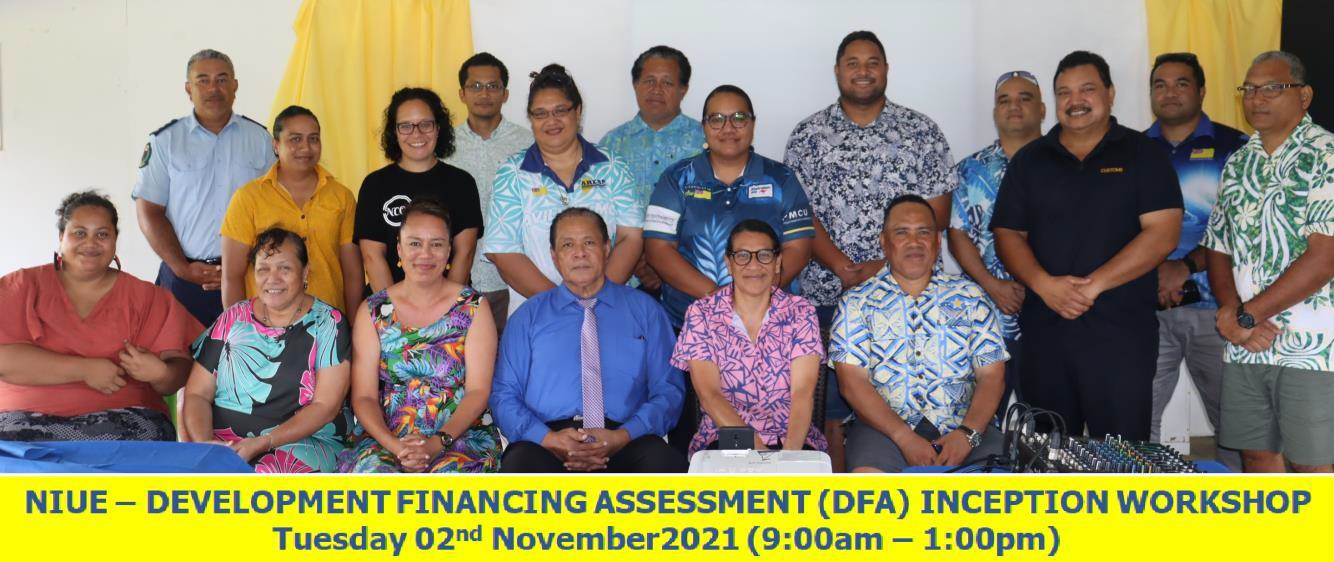Niue launches process for Development Financing Assessment
November 9, 2022

The Niue Government is now working on its first Development Financing Assessment Report (DFA), a tool that will assist and support the government in shaping the inception phase of their Integrated National Financing Framework (INFF).
This comes after the inception workshop for the DFA Process held on November 1st 2022, under the Sustainable Development Goals (SDG) Financing – Component 1 Joint Programme, funded by the Joint SDG Fund, and implemented by the United Nations Development Programme (UNDP), UN Women and the United Nations Economic and Social Commission for Asia and the Pacific (UNESCAP) in collaboration with the Government of Niue.
The DFA process is based on national financing priorities. It is comprised of a comprehensive analysis of financing flows, policies, institutions, and capacities; and identifies gaps for improvement with recommendations for relevant reforms.
At the opening of the workshop, Niue’s Minister of Finance, Crossley Tatui, shared Niue’s current approach to the SDGs and reiterated the need to consider other regional and global development goals. “While I am pleased to share Niue’s national integrated strategic planning approach, we also need to ensure that we include the United Nations’ SDG 2030 framework, the 2050 Strategy for the Pacific Blue Continent, and other regional meeting outcomes into our national development plan.”
A notable step in Niue’s financial reforms programme was it becoming a member of the Asian Development Bank in March 2019, and it is on the way towards IMF membership. These key
Partnerships with PFTAC and key development partners, New Zealand and Australia, are key to Niue’s achievement of its vision of building a prosperous nation.
The Minister also told the participants: “The workshop links with two key pillars: Financial Security and Economic Development, and Good Governance. I urge the participants to learn as much and contribute to the discussions as much as possible.”
The workshop was led by the Niue Ministry of Finance in collaboration with UNDP, the DFA Team, and support from the SDG Financing Regional Team. It was well attended by a wide range of national stakeholders from government, private sector, civil society, and development partners.
The workshop concluded with a consensus amongst the stakeholders to validate the implementation of the DFA Tool and Process, with the way forward and next steps being the DFA Comprehensive Analysis, and Financial Dialogues and Roadmap.
The Roadmap will identify strategic financing solutions for recovery that will inform and determine the operationalization of Niue’s Integrated Financing Framework in the national context.
“UNDP is pleased to work with the Government of Niue on the development of its first DFA Report, as the primary stepping-stone towards establishing their Integrated National Financing Framework. The implementation of this Joint Programme is a timely initiative, considering the financial impacts and shocks that Niue, like all our other islands, had endured due to the COVID-19 Pandemic. These unprecedented events have contributed to a paradigm shift not only on national priorities, but also the financing infrastructure and landscape of Niue that warrants a new, catalytic and optimized approach to financing management,” said Jorn Sorensen, UNDP Resident Representative.
The project supports countries to formulate and operationalize the INFFs as agreed to in the Addis Ababa Action Agenda (AAAA), and to empower countries to mobilize additional financing to accelerate SDG achievements and national development priorities.
The project focuses on developing financing strategies and operationalizing the INFFs for the Cook Islands, Niue, and Samoa to provide them with opportunities to enhance the management of financial flows and mobilize new, diverse, and innovative and catalytic financial instruments to accelerate the progress of the 2030 Agenda for Sustainable Development.
Linking budget allocations with national priorities and the SDGs will contribute towards performing evidence-based financial management, allowing the Government and its partners to make strategic investments that advance sustainable development at lower transaction costs.
END

 Locations
Locations
